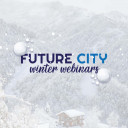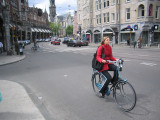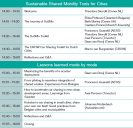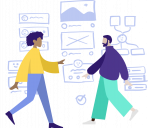Stay in the know on all smart updates of your favorite topics.
Kunstmatige Intelligentie werklab Amsterdam

Praat en beslis mee over de toepassing van kunstmatige intelligentie in Amsterdam. Tijdens het werklab ga je in gesprek over een concrete casus over het gebruik van een sensorenregister in de stad. Hoe moeten we daar volgens jou mee omgaan?
Een extra paar ogen is soms best handig. In Amsterdam zijn er veel extra ogen: camera’s en sensoren. Deze camera’s en sensoren zijn van de gemeente, maar ook van de buurtsupermarkt, dat grote internationale bedrijf of uw buurman. Gemeente Amsterdam wil graag weten hoeveel camera’s en sensoren er in Amsterdam zijn. Het is mogelijk om met kunstmatige intelligentie data van camera’s en sensoren in kaart te brengen. Maar hoe zit het met de privacy van Amsterdammers als zulke data worden verzameld? En is het automatisch in kaart brengen van camera’s en sensoren wel een goed idee?
Wij nodigen u van harte uit voor het KI-werklab, dé plek waar Amsterdammers met elkaar nadenken over het gebruik van slimme toepassingen in de stad. Het werklab wordt georganiseerd door Netwerk Democratie.
Special: Opgavegericht innoveren op druktemanagement
Steden worden weer zichtbaar drukker. Hoe zorgen we ervoor dat we in deze tijd relevante data verzamelen om de juiste afwegingen te maken?
Gemeente Amsterdam neemt jullie graag mee in de laatste ontwikkelingen van hoe data nu worden ingezet. En welke slimme connecties zij onderling hebben gevonden, ten behoeve van drukte monitoring en management in de openbare ruimte. Leer hoe het crowd monitoring project niet alleen wordt ingezet voor een leefbare stad, maar hoe ook een nieuwe manier van werken wordt neergezet waarbij innovatie en implementatie samenkomen. We gaan graag met jullie in gesprek over de toekomst.
Locatie: Pakhuis de Zwijger (Piet Heinkade 179, Amsterdam)
Interesse in deze bijeenkomst? Stuur dan een e-mail aan Dhr. D. Groenink, d.groenink@amsterdam.nl voor een persoonlijke uitnodiging.
Er zijn een beperkt aantal plaatsen beschikbaar.
Invitation to co-create European transition pathways for more resilient, greener and digital industrial ecosystems

One of the key priorities of the European Commission is to support the twin transition to a green and digital economy. One way the Commission is shaping this transition is by co-creating transition pathways for more resilient, green and digital industrial ecosystems, across different sectors.
Within the scope of the Intelligent Cities Challenge, Amsterdam Region contributed to a stakeholder consultation session on 9 February 2022. Mirko van Vliet, Amsterdam Economic Board Strategic Advisor shared the region’s experience using future scenarios as a tool for assessing developments in inherently unpredictable and complex systems. In this approach, scenarios are not forecasts but alternative images of how the future can unfold. The approach can be used to stimulate discussion and action around key opportunities, threats, driving forces and no regret measures to achieve a desired vision.
Beyond visions, achieving the digital and green transition requires concrete initiatives. Mirko shared the example of LEAP, a coalition of the willing that aims to speed up the transition to a sustainable digital infrastructure by deploying and accelerating existing and new technologies. One of the topics explored within LEAP is the possibility of shifting away from hyper-scale, monolithic data-centers to more flexible, distributed and disaggregated infrastructures. LEAP exemplifies Amsterdam Economic Board's approach to building a robust ecosystem through multi-stakeholder collaboration in order to transition the data-center and digital infrastructure value chains.
Would you like to help shape the transition pathways for more resilient, greener and digital industrial ecosystems? The Commission is inviting all interested stakeholders to co-create transition pathways for three sectors / ecosystems:
- Proximity & social economy ecosystem, consultation closes February 28
- Construction ecosystem, consultation closes February 28
- Mobility ecosystem, consultation closes March 31
Based on the results of these consultations, the Commission will organise further meetings with stakeholders to finalise the various pathways in 2022.
For more information visit: https://ec.europa.eu/growth/consultations_en
Waarom de slimme stad een must have is?

Daarover gaan we in gesprek met de opdrachtgevers en onderzoekers van het Ecorys rapport: Maatschappelijke impact van Slimme en Duurzame verstedelijking.
Het afgelopen jaar verschenen er tal van rapporten over digitalisering en technologisering. Maar wat zijn de vervolgstappen? Welke lessen kunnen we trekken voor de slimme stad? Welke ideeën kunnen ons gaan inspireren in dit nieuwe smartcityjaar?
Dit soort gesprekken voer je normaal gesproken als je elkaar tegenkomt tijdens een nieuwjaarsborrel, een congres of een andere netwerkbijeenkomst. Helaas kan dit nu even niet fysiek, maar gelukkig laat het digitale ons niet in de steek. Zo kunnen we toch met elkaar nieuwe kennis delen en verspreiden.
Daarom is de Future City Foundation op zoek gegaan naar de makers en bedenkers dit rapport. We vragen aan Jessica Dirks, Walter Hulsker (onderzoekers van Ecorys), Noor van den Brink en Caspar de Jonge (ministerie van IenW) wat er volgens hen zwaar ingezet moet worden op slimme en duurzame verstedelijking.
Datum: 24 februari, 16.00 – 17.00 uur.
Kosten: Gratis
MELD U NU AAN
Uit het rapport van Ecorys in opdracht van het ministerie van Infrastructuur en Waterstaat blijkt dat het effectief combineren en inzetten van smartcityprojecten noodzakelijke oplossingen zijn voor het ruimtegebrek in Nederland. En dat slim en binnenstedelijk bouwen niet alleen leidt tot meer leefbare steden, maar ook tot andere positieve effecten leiden, die financieel en maatschappelijk meer opleveren dan traditioneel bouwen aan de randen van steden.
Daarover gaan op donderdag 24 februari in gesprek met de onderzoekers van Ecorys:
Wilt u weten wat de meerwaarde van smartcityprojecten is? En waarom ze niet langer ‘leuk om te hebben’, maar ‘noodzakelijk’ zijn? Meld u dan nu aan!
MELD U NU AAN
Meer weten?
Wilt u zich alvast inlezen? Lees dan hier het Ecorys rapport.
Amsterdam launches bike safety innovation competition

Amsterdam is inviting universities, companies and members of the public to come up with solutions to improve bike safety in the Dutch capital through an open challenge.
The central theme of the competition – “Different speeds on bicycle paths” – aims to influence the behaviour of road users and asks how bike delivery services, and differences in speed bicycle types can impact this.
Applications are open until February 24, with the winner set to be announced on April 11.
Policy guidelines and ethical principles for digital technology

The 9th episode of the series Building sustainable cities: the contribution of digital technology deals with guidelines and related ethical principles that apply to the design and application of digital technology.
One thing that keeps me awake at night is the speed at which artificial intelligence is developing and the lack of rules for its development and application said Aleksandra Mojsilović, director of IBM Science for Social Good. The European Union has a strong focus on regulations to ensure that technology is people-oriented, ensures a fair and competitive digital economy and contributes to an open, democratic and sustainable society. This relates to more than legal frameworks, also to political choices, ethical principles, and the responsibilities of the profession. This is what this post is about.
Politicians are ultimately responsible for the development, selection, application and use of (digital) technology. In this respect, a distinction must be made between:
• Coordination of digital instruments and the vision on the development of the city.
• Drawing up policy guidelines for digitization in general.
• Recognizing related ethical principles next to these policy guidelines.
• Creating the conditions for democratic oversight of the application of digital technology.
• Make an appeal to the responsibilities of the ICT professional group.
Guidelines for digitization policy
In the previous post I emphasized that the digital agenda must result from the urban policy agenda and that digital instruments and other policy instruments must be seen in mutual relation.
Below are five additional guidelines for digitization policy formulated by the G20 Global Smart Cities Alliance. 36 cities are involved in this initiative, including Apeldoorn, as the only Dutch municipality. The cities involved will elaborate these guidelines soon. In the meantime, I have listed some examples.
Equity, inclusiveness, and social impact
• Enabling every household to use the Internet.
• Making information and communication technology (ICT) and digital communication with government accessible to all, including the physically/mentally disabled, the elderly and immigrants with limited command of the local language.
• Assessing the impact of current digital technology on citizens and anticipating the future impact of this policy.
• Facilitating regular education and institutions for continuous learning to offer easily accessible programs to develop digital literacy.
• Challenging neighborhoods and community initiatives to explore the supportive role of digital devices in their communication and actions.
Security and resilience
• Developing a broadly supported vision on Internet security and its consequences.
• Mandatory compliance with rules and standards (for instance regarding IoT) to protect digital systems against cyberthreats.
• Becoming resilient regarding cybercrime by developing back-up systems that seamless take over services eventually.
• Building resilience against misuse of digital communication, especially bullying, intimidation and threats.
• Reducing the multitude of technology platforms and standards, to limit entry points for cyber attackers.
Privacy and transparency
• The right to move and stay in cities without being digitally surveilled, except in case of law enforcement with legal means.
• Establishing rules in a democratic manner for the collection of data from citizens in the public space.
• Minimalist collection of data by cities to enable services.
• Citizens' right to control their own data and to decide which ones are shared and under which circumstances.
• Using privacy impact assessment as a method for identifying, evaluating, and addressing privacy risks by companies, organizations, and the city itself.
Openness and interoperability
• Providing depersonalized data from as many as possible organizations to citizens and organizations as a reliable evidence base to support policy and to create open markets for interchangeable technology.
• Public registration of devices, their ownership, and their aim.
• Choosing adequate data architecture, including standards, agreements, and norms to enable reuse of digital technology and to avoid lock-ins.
Operational and financial sustainability
• Ensuring a safe and well-functioning Internet
• The coordinated approach ('dig once') of constructing and maintenance of digital infrastructure, including Wi-Fi, wired technologies and Internet of Things (IoT).
• Exploring first, whether the city can develop and manage required technology by itself, before turning to commercial parties.
• Cities, companies, and knowledge institutions share data and cooperate in a precompetitive way at innovations for mutual benefit.
• Digital solutions are feasible: Results are achieved within an agreed time, with an agreed budget.
Ethical Principles
The guidelines formulated above partly converge with the ethical principles that underlie digitization according to the Rathenau Institute. Below, I will summarize these principles.
Privacy
• Citizens' right to dispose of their own (digital) data, collected by the government, companies and other organizations.
• Limitation of the data to be collected to those are functionally necessary (privacy by design), which also prevents improper use.
• Data collection in the domestic environment only after personal permission and in the public environment only after consent by the municipal council.
Autonomy
• The right to decide about information to be received.
• The right to reject or consent to independent decision making by digital devices in the home.
• No filtering of information except in case of instructions by democratically elected bodies.
Safety
• Ensuring protection of personal data and against identity theft through encryption and biometric recognition.
• Preventing unwanted manipulation of devices by unauthorized persons.
• Providing adequate warnings against risks by providers of virtual reality software.
• Securing exchange of data
Public oversight
• Ensuring public participation in policy development related to digitization
• Providing transparency of decision-making through algorithms and opportunity to influence these decisions by human interventions.
• Decisions taken by autonomous systems always include an explanation of the underlying considerations and provide the option to appeal against this decision.
Human dignity
• Using robotics technology mainly in routinely, dangerous, and dirty work, preferably under supervision of human actors.
• Informing human actors collaborating with robots of the foundations of their operation and the possibilities to influence them.
Justice
• Ensuring equal opportunities, accessibility, and benefits for all when applying digital systems
• If autonomous systems are used to assess personal situations, the result is always checked for its fairness, certainty, and comprehensibility for the receiving party.
• In the case of autonomous analysis of human behavior, the motives on which an assessment has taken place can be checked by human intervention.
• Employees in the gig economy have an employment contract or an income as self-employed in accordance with legal standards.
Power relations
• The possibility of updating software if equipment still is usable, even if certain functionalities are no longer available.
• Companies may not use their monopoly position to antagonize other companies.
• Ensuring equal opportunities, accessibility, and benefits for all when applying digital systems.
The above guidelines and ethical principles partly overlap. Nevertheless, I have not combined them as they represent different frames of reference that are often referred to separately. The principles for digitization policy are particularly suitable for the assessment of digitization policy. The ethical principles are especially useful when assessing different technologies. That is why I will use the latter in the following episodes.
In discussing the digitalization strategy of Amsterdam and other municipalities in later episodes, I will use a composite list of criteria, based on both the above guidelines and ethical principles. This list, titled 'Principles for a socially responsible digitization policy' can already be viewed HERE.
Democratic oversight
Currently, many municipalities still lack sufficient competencies to supervise the implementation and application of the guidelines and principles mentioned above. Moreover, they are involved as a party themselves. Therefore, setting up an independent advisory body for this purpose is desirable. In the US, almost every city now has a committee for public oversight of digitization. These committees are strongly focused on the role of the police, in particular practices related to facial recognition and predictive policing.
Several cities in the Netherlands have installed an ethics committee. A good initiative. I would also have such a committee supervise the aforementioned policy guidelines and not just the ethical principles. According to Bart Wernaart, lecturer in Moral Design Strategy at Fontys University of applied sciences, such a committee must be involved in digitization policy at an early stage, and it should also learn from mistakes in the field of digitization in the past.
The latter is especially necessary because, as the Dutch Data Protection Authority writes, the identity of an ethically responsible city is, is not set in stone. The best way to connect ethical principles and practice is to debate and questions the implications of policy in practice.
Experts’ own responsibility
A mature professional group has its own ethical principles, is monitoring their implementation, and sanctioning discordant members. In this respect, the medical world is most advanced. As far as I know, the ICT profession has not yet formulated its own ethical principles. This has been done, for example, by the Institute of Electric and Electronic Engineers (IEEE) in the field of artificial intelligence. Sarah Hamid: Data scientists are generally concerned more with the abstract score metric of their models than the direct and indirect impact it can have on the world. However, experts often understand the unforeseen implications of government policy earlier than politicians. Hamid addresses the implications for professional action: If computer scientists really hoped to make a positive impact on the world, then they would need to start asking better questions. The road to technology implementation by governments is paved with failures. Professionals have often seen this coming, but have rarely warned, afraid of losing an assignment. Self-confident professionals must therefore say 'no' much more often to a job description. Hamid: Refusal is an essential practice for anyone who hopes to design sociotechnical systems in the service of justice and the public good. This even might result in a better relationship with the client and more successful projects.
Establishing policy guidelines and ethical principles for municipal digitization requires a critical municipal council and an ethics committee with relevant expertise. But it also needs professionals who carry out the assignment and enter the debate if necessary.
The link below opens a preliminary overview of the already published and upcoming articles in the series Building sustainable cities: the contribution of digital technology. Click HERE for the Dutch version.
7. The Future of Urban Tech-project

The seventh edition of the series Better cities. The contribution of digital technology is about forecasts, trends and signals regarding the role of technology in the development of cities, as seen by Cornell University's Future of Urban Tech-project. The Dutch versions of this and other already published posts are here.
A source of new insights
Technology has changed the planet for better and for worse. Will this change continue, and which direction will dominate? To answer this question, scientists at the Jacobs Institute at Cornell University in New York developed a horizon scan, named The Future of Urban Tech. At first, they made a content analysis of hundreds of recent scientific publications, from which they distilled 217 signals. These signals were grouped into 49 trends, full of contradictions. Each trend is tagged with an indication of time frame, probability, and societal impact. In the end, they modeled six forecasts. These describe dominant directions for change.
Readers can use the site in their own way. I started from the 17 sectors such as built environment, logistics, mobility, and energy and explored the related trends. It is also possible to start top-down with one of the six forecasts and examine its plausibility considering the related trends and signals. I will show below that each of the forecasts is challenging and invites further reading.
Content selection is supported by dynamic graphics, which connect all signals, trends and forecasts and enable the reader to see their interrelationships. Just start scrolling, unleash your curiosity and decide after some explorations how to proceed more systematically.
The website briefly describes each of the forecasts, trends, and signals. Each signal reflects the content of a handful of (popular) scientific publications, which are briefly summarized. Read the articles that intrigue you or limit yourself to the summary.
Take the time to explore this site as you will encounter many new insights and opinions. The link to the project is at the end of this article.
Below I will explain some aspects of the content of the project, followed by some caveats.
Six forecasts
The forecasts reflect the multiplicity of views in contemporary scientific literature, stimulating readers to form a judgment. The wording of the forecasts is reproduced in abbreviated form below.
1. All buildings, houses, means of transport, infrastructure, but also trees and parks will be connected with sensors and cameras and form one web.
Many buildings, buses, trains, and roads are already equipped with digital detection, but they are not linked yet up at city scale. The next decade will change this, which will, for example, mean a breakthrough in the management of energy flows, but also raise questions regarding privacy.
2. Cities will use advanced biotechnology to take livability to new heights.
Growing understanding of human dependence on nature will lead to mapping the physical-biological world as well as its threats and its blessings to humans. City authorities will equip trees, parks, and waterways with sensors to measure and control the vitality of ecosystems.
3. Resilient corridors will mitigate the impact of climate change, but citizens will be prepared for the inevitable shocks to come.
Cities will reduce CO2 emissions but also prepare for the inevitable consequences of climate change. Political and financial centers of power will be concentrated in places where the impact of climate change can be controlled by technical means.
4. Artificial neural networks provide advanced forms of machine learning with unparalleled predictive capabilities that will bring order to the chaos of urban life.
Machine learning and artificial intelligence will become inscrutable black boxes that make decisions without giving explanations. The ultimate questions are whether the machines to which we outsource our decisions can still be controlled themselves and whether the impact of spontaneous encounters and human ideas disappears if computers produce the best solutions after all?
5. New Screen Deal that redistributes the risks and benefits of urban technology.
“Everything remote” – learning, healthcare, work, and entertainment – is becoming the new normal. The predictive power of AI will lead to conflicts over the concentration of wealth and power that digital platforms cause. But on the other hand, new stakeholders will focus on equity.
6. A global supply chain for city-building technologies will 'crack the code of the city'.
In the smart cities-movement there is a tension between top-down and bottom-up, between proprietary versus open and between Big Tech and Makers. A new urban innovation industry will take dominance but will be more attuned to societal concerns. Governments, in turn, will have a clearer picture of the problems that the industry needs to solve. A public-private structure for investments and governance is indispensable to counter the power of Big Tech.
A few notes
As mentioned, each of the six forecasts is based on trends. Nine trends, in the case of the latest forecast mentioned above. Each trend is illustrated by a handful of signals, documented by various publications. One of the nine trends supporting the latter forecast is “Regional clustering from enterprises to ecosystems”, for example New York, London, Berlin, and Amsterdam. This refers to the growing power of local technology hubs, supported by regional capital and involving governments, start-ups, knowledge institutions and citizens. This concentration could even lead to a new “space race” between cities instead of countries. However, the underlying signals show that this "trend" is more open-ended and uncertain than its description warrants.
I went through many publications documenting the signals and concluded that "trends" essentially map the bandwidth within developments within a domain will occur. To me, this does not detract from the value of the exercise, because the more doubts there are about the future and the more insights we have into the forces that shape it, the more opportunities we have to influence the future.
As the six forecasts must match the open nature of the trends, I have reformulated each of these forecasts as pairs of conflicting directions for development.
1. The commercial or political interests behind urban technology versus the well-being and privacy of citizens.
2. The struggle between 'Big Tech' versus (supra)national political over leadership over technological development.
3. The infusion of technology into all domains of society versus acceptance of unpredictable outcomes of human interactions resulting from creativity, inner motives, and intuitive decisions.
4. Controlling nature through biotechnology versus restoring a balance between humans and natural ecosystems.
5. The concentration of power, political influence, and wealth through control over technology versus open licensing that allows technology to be used for the benefit of the entire world population.
6. Autonomous decision-making through machine learning and artificial intelligence versus the primacy of democratic and decentralized decision-making over the application of technology.
Studying the Future of Urban Tech-project has been a rich and thought-provoking learning experience and has helped fueling the insights underlying this series.
You can find the Future of Urban Tech project behind the link below:
CityFlows Final Project Workshop

Over the past 1.5 years, CityFlows partners have worked on improving liveability of crowded pedestrian spaces by developing and testing the use of a Crowd Monitoring Decision Support Systems (CM-DSS) in different settings.
As the project nears competition, this final online workshop will share and validate the results and lessons learned from living labs in Amsterdam, Barcelona and Milan. The workshop will also present a selection of international best practices for crowd-management collected through the CityFlows Educational Package open call.
Draft Agenda -- Speakers will be announced soon!
• Welcome & introductions
• Overview to CityFlows project
• Short keynote on responsible crowd-management innovations
• Presentation of results and lessons learned from CityFlows Living Labs
• Q&A with audience
• Final reflections & wrap-up
Crowd-management researchers and practitioners are encouraged to join the event and reflect on the findings from the project.
To join this webinar, please register in advance via:
https://us02web.zoom.us/meeting/register/tZcvd-qgrzIiG9P2pmV46PUhxFjOUi7HR-DK
After registering, you will receive a confirmation email containing information about joining the meeting.
For more information about the CityFlows project visit: https://cityflows-project.eu/
4th ICC City Lab

The 100 Intelligent Cities Challenge (ICC) is an initiative of the European Commission (EC) supporting municipalities in adopting new technologies to tackle the COVID-19 crisis and rebuild their economies while steering them in the direction of green, smart and sustainable growth. The focus is on supporting mid-size and smaller municipalities with improving the quality of life for citizens and business competitiveness.
Throughout the 2.5 year challenge, a series of five City Labs bring together ICC cities and stakeholders with the following objectives:
1. Inspire with state-of-the-art re-thinking of the city of the future and its role amidst new climate change and digital growth ambitions;
2. Peer-to-peer review of ICC core cities’ implementation plans;
3. Present initiatives which entered the phase of implementation and exchange of views on maximising impact;
4. Provide opportunities to explore the possibility of collaboration between cities with an interest in developing joint solutions;
5. Allow the exchange of knowledge between city teams during interactive thematic sessions;
6. Provide transversal support on access to finance, public procurement, and open data.
The 4th ICC City lab will kick off on November 30th with public sessions on up-skilling-and re-skilling open both to the ICC community and external participants.
As ICC mentor, the Amsterdam Metropolitan Region, will contribute to a Thematic Workshop on Green Economy and Local Green Deals on Wednesday, December 1st. During the workshop, Yolanda Schmal, policy advisor at the Province of North Holland will share best practices and current initiatives for accelerating the circular economy on a regional scale, with focus on plastics.
The full program and registration is available via: https://www.intelligentcitieschallenge.eu/events/4th-icc-city-lab
Shared mobility for more liveable cities. How can we make it work?

Join us at the EIT Climate-KIC Sustainable Shared Mobility (SuSMo) closing webinar on the 7th of December 14:00 - 16:00 to find out how to introduce shared mobility in your city and learn from the experiences from European frontrunners.
The SuSMo partners will present learning material and guidelines for introducing, managing and regulating shared mobility in cities. In addition to the SuSMo partners we introduce speakers from CROW and autodelen.net. CROW will present their car sharing toolkit for Dutch municipalities while autodelen.net will discuss best practices from car sharing in Belgium. See the attached agenda for the full list of speakers and topics.
You do not want to miss this webinar!
Please register here: https://tinyurl.com/SuSMoWebinar
We look forward to meeting you online!
Helsinki and Amsterdam invite motorists to ‘code the streets’

Helsinki and Amsterdam are inviting motorists to take part in a study that aims to offer the most socially responsible driving routes in each city.
Code the Streets – an EU-sponsored mobility initiative which will run throughout October and November – asks drivers to test new functions in the traffic navigation app TomTomAmiGO and Mercedes-Benz’ navigation planner, to better understand how to route motorists in a more environmentally aware way.
This includes suggestions on avoiding roads close to schools, residential areas, and parts of the city with high pollution.
The initiative is a collaboration between the City of Amsterdam, City of Helsinki, Aalto University, Amsterdam Institute for Advanced Metropolitan Solutions (AMS Institute), Forum Virium Helsinki, Technical University Delft and The Future Mobility Network, and is funded by TomTom, Mercedes-Benz and EIT Urban Mobility.
Read the full story here: https://cities-today.com/helsinki-and-amsterdam-invite-motorists-to-code-the-streets/
Introducing Innovatie Partners for innovative entrepreneurs

The City of Amsterdam launched a platform for entrepreneurs who want to collaborate on innovation with the public sector.
If you want to work with government and other large organisations, you need to apply for tenders and grants. These application procedures are often complex. Using clear information and useful checklists, Innovatie Partners makes tenders and grants accessible for small entrepreneurs, such as startups, scale-ups and MKB.
On the platform
- Projects from organisations such as Gemeente Amsterdam, the Metropole Region Amsterdam (MRA) and Startup in Residence. Take a look at past and current projects (in Dutch).
- Road maps of how to apply for your tender or grant of choice.
- Explainers on what tenders and grants are and how they work, such as a glossary of unavoidable jargon (in Dutch).
- Detailed instructions and screencasts of how to fill out complicated forms (in Dutch).
Toekomst van het spoor: Nog meer bouwen?

In deze podcast, praktische voorbeelden uit de Rotterdamse haven en Groningen. Een vernieuwend herontwerp van spoor aanvraag richting infra groeifonds van Dijsselbloem ipv alle traditionele aanvragen voor extra spoor.
Luister naar ProRail innovatiemanager Karel van Gils: https://bit.ly/Karelgils
Podcast met Rijksbouwmeester Floris Alkemade

‘Andere ontwerpprincipes voor een mobiliteitsysteem zijn noodzakelijk.’ Deze podcast met Floris van Alkemade over de kunst van verandering is nog altijd actueel (deze zomer te gast bij Zomergasten VPRO).
‘Vergrijzing kan een enorme maatschappelijke potentie hebben’
Geert Kloppenburg en Alexander van Altena spreken met rijksbouwmeester Floris Alkemade over waarom verandering eigenlijk helemaal niet radicaal is. Wat gebeurt er als je met andere ontwerpprincipes naar mobiliteit gaat kijken? En hoe kunnen we buitenwijken inrichten voor de mobiliteit van de toekomst?
Vacature: Samen impact maken op transities in de leefomgeving

Als SMC| Strategie en Management Consultants van Royal HaskoningDHV zijn we op zoek naar mensen die 'samen' impact willen maken op de transities in onze leefomgeving. Niet omdat ze weten hoe het moet, maar omdat ze anderen kunnen begeleiden in hoe het kan! 'Gedeeld Eigenaarschap' noemen we dat in onze visie op samen werken aan maatschappelijke veranderopgaven.
Voor de volgende vacatures na de zomervakantie komen we graag nu al met je in contact:
→ Proces- en programmamanager nationale en regionale energiestrategieen en PPS (circa 10 jaar ervaring);
→ Senior-Consultant Bestuur, Programma’s en Organisatie (circa 10 à 15 jaar ervaring)
→ Proces-professionals Klimaat, Energie, Ruimte, Mobiliteit en Landbouw (circa 2 à 7 jaar ervaring).
Voor een eerste 'teen in het water', bel of mail al gerust met pascal.lamberigts@rhdhv.com / 06 – 22 37 86 65. Dan passen we onze vacatures graag aan op jouw kwaliteiten en meerwaarde.
→ Voor een kijkje in de keuken bij ministeries, provincies, gemeenten, waterschappen en - steeds meer - ook bedrijven;
→ Voor strategisch mensenwerk in de voorfase van nieuwe ontwikkelingen, met 6.500 collega's als inhoudelijke sparringpartners in een groot, internationaal bedrijf;
→ Voor samenwerken in een cultuur gebaseerd op de principes van de netwerkorganisatie – veel vrijheid, veel verantwoordelijkheid;
→ Voor een eigen SMC Academy gericht op samen leren en ontwikkelen in proces- en programmamanagement en organisatieontwikkeling;
→ Voor de snelste leercurve in opgavegericht werken voor young professionals als springplank naar een volgende uitdagende baan bij ministeries, provincies en grote gemeenten.
Code the Streets - Creating innovative solutions for sustainable, inclusive and safe mobility.

As Amsterdam’s metropolitan area continues to grow, so do traffic related issues such as congestion, crowded streets, and increasing pressures on fragile infrastructures. Just like cities worldwide, the City of Amsterdam is faced with the challenge of finding better ways to manage urban mobility. Code the Streets wants to support cities with this challenge by bringing together cities, mobility providers and science to create sustainable and inclusive mobility solutions that keep cities liveable, now and in the future.
Code the Streets is working on improving an already existing navigation app by adding data about school zones, fragile infrastructures, congestion and pollution. We want to stimulate car-users to choose an alternative route, for example one that avoids school zones or vulnerable city infrastructure. That way we work to towards a more sustainable way of driving and make the streets of Amsterdam safer and less crowded. Starting in autumn, we will be running pilot programs testing the application in Amsterdam. Interested in trying the app? Sign up here.
Code the Streets is an European EIT Urban Mobility Project bringing together partners from Amsterdam, Helsinki and Budapest to work on innovative solutions for sustainable, inclusive and safe mobility.
Note from ASC: What do you think? Let’s hear it in the comments!
Urban Mobility: Cycling transitions in two major European cities

After approximately 15 podcast interviews with experts from around the world, it's time for researcher/advisor/podcastmaker Geert Kloppenburg to look back at the best practices. He started 2,5 years ago with the idea to just contact people in the cities who are actually implementing changes in the streets at this moment. He has discovered so many great best practices that he would like to share.
Geert visited different cities around the world to interview experts on cycling and mobility and noticed an explosion in cycling. And when Corona came, the use of bicycles grew even more.
In this interview Geert looks back on 15 podcast and video interviews on the transformation of different cities.
Watch the 9 minute video and let us know what you think.
Note from ASC: What are your thoughts after watching 👀? Let us know bellow.
Subsidies voor duurzaam economisch herstel in tijden van Corona

De Amsterdamse economie is zwaar getroffen door de coronacrisis. Daarom heeft gemeente Amsterdam extra geld beschikbaar gesteld om de economie juist in deze moeilijke tijden aan te jagen.
De subsidies zijn bedoeld om vernieuwing en werkgelegenheid in onderstaande sectoren te realiseren:
• circulaire economie
• energietransitie
• schone en slimme mobiliteit
• digitaliseren
• gezondheid
De steun zal in de vorm zijn van twee subsidies. Hieronder lees je meer over de subsidies.
Subsidie om een projectvoorstel te schrijven
Amsterdam stelt extra geld beschikbaar voor ondernemers die bijdragen aan duurzaam economisch herstel in tijden van corona. Heb je een idee dat niet van de grond komt tijdens de coronacrisis? Ontvang tot 25.000 euro om een projectvoorstel van tenminste 2 miljoen te ontwikkelen voor een Nationaal of Europees coronaherstel- of stimuleringsfonds.
Kijk op de website om te zien of jij in aanmerking komt voor de subsidie of om je direct in te schrijven.
Subsidie om een project te realiseren
Amsterdam stelt extra geld beschikbaar voor ondernemers die bijdragen aan duurzaam economisch herstel in tijden van corona. Heb je een project dat niet van de grond komt tijdens de coronacrisis? Krijg 100.000 tot 500.000 euro subsidie om jouw project te realiseren.
Zie de website om te kijken of jij in aanmerking komt voor de subsidie of om je direct in te schrijven.
Help! My grid is congested

We proudly invite you to the EV Energy Final Conference happening on 12 May 2021 from 9:30 am - 11:30 am online.
Over four years of project implementation. It's been a long and exciting journey for all of us. Along the way we have been able to share our experience, learn from each other and implement successful practices in our regions.
Our final conference presents how practical experiences and regional policy incentives were shared and led to new insights, policy recommendations and running action.
Cities and regions are on the path towards clean mobility, made possible by local renewable energy. We present 5 EU-cities and regions (Amsterdam, Barcelona, Kaunas, Rome and Stockholm), which have been actively collaborating in transition efforts, sharing learnings from policy making, planning and implementation. Although the stages of development vary between these cities, this collaboration has been very fruitful and inspirational.
The event is dedicated to policy makers, project teams, CPO’s, energy companies and local initiatives aimed at adopting renewable energy as a pillar in their future actions.
Event: Best practices from Europe’s cycling cities

Join us on June 1st for Celebrating Cycling Cities, a two-hour event during which representatives from European cities and EU institutions will discuss best practices for how to shape more cycle-friendly urban mobility systems.
Confirmed speakers are:
• Frans Timmermans (EU)
• Matthew Baldwin (Mission Manager of “100 Climate-Neutral Cities by 2030”)
• Stientje van Veldhoven (Dutch State Secretary for Infrastructure and Water
• Management) CIVITAS Handshake project
When: Tuesday June 1st.
What time: 15:00-17:00
Where: online, via a live broadcast from Pakhuis de Zwijger, Amsterdam.
Register for the event and learn all about Europe's best cycle-friendly cities.
Do you want to learn more already? Listen to this podcast. How is Paris reshaping its iconic streets and getting rid of cars? That is the subject of this interview with the deputy mayor of Paris, Christophe Najdovski.
Stay up to date
Get notified about new updates, opportunities or events that match your interests.

